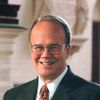Johann Sebastian Bach and George Friedrich Handel, two of the great composers of the early modern world, signed their scores with the abbreviation, "S. D. G.," standing for Soli Deo Gloria or "Glory to God Alone." But it isn't just the masters of high culture who bring glory to God. To give glory to God and enjoy him forever: that is all humanity's chief and highest end, according to the first question of the Westminster Shorter Catechism. In fact, whatever we do, whether working a lathe, kneading bread, cobbling a shoe, managing a computer database, developing pharmaceutical products, or preparing personnel training manuals’whatever our calling in this world’we do and should ever strive to bring glory to God.
In this issue we reflect on our work in this life east of Eden. Our theme is God's common grace in giving every creature made in his image a calling and vocation. Vocation is a doctrine linked with God's wise and providential rule, as we are reminded by Lutheran scholar and provost of Patrick Henry College, Gene Edward Veith. In fact, it is how God "hides" himself in the world’working in and through our work, as well as our neighbors', to sustain and govern all things. We aren't just pushing a boulder up a mountain, explains Alan Maben, but each and every kind of work is a calling from God filling a role in his world.
Living in a manner worthy of our calling in this life, however, requires a tremendous amount of wisdom. Editor-in-chief Michael Horton reminds us that we are all "on a long road to maturity," and that we can glean insight and help from the most surprising places. The truth of this is on display in Ethan Richardson's look into public radio "parables" of sin and salvation, brokenness and redemption, in the widely popular radio program This American Life. In our theology department, Pastor Matthew Everhard insists on the importance of declaring the whole counsel of God, even if this means a hard teaching such as the doctrine of hell.
Also in this issue, we tackle a controversial topic of the day, namely, the holiness wars. Prompted by evangelical Internet skirmishes over the place of God's law in Christian obedience, Horton argues that while there are multiple idiosyncratic ways to explain the relationship between the gospel and Christian living for God's glory, there is nonetheless one biblical and broadly Reformational approach, which is excellently summarized in the Lutheran and Reformed confessions. These are confessions of biblical truth that evangelicals desperately need to consider.
Reformers of all ages past and present should be uncompromising about the absolutely free grace of God found in Jesus Christ, as well as the necessity and usefulness of God's law for living our lives in service to our neighbor. In the gospel, we are swept off the treadmill of trying to merit God's blessing through our own good works, and freed to serve our neighbor through our vocations. Luther put it so well: "God doesn't need your good works. Your neighbor does."







